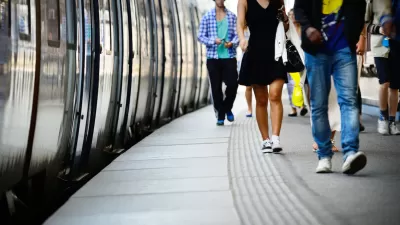Behavioral science is informing the city’s efforts to change the way people commute.

Durham, North Carolina, is one of nine cities that was awarded a $1 million grant through Bloomberg Philanthropies’ Mayors Challenge. The city plans to use the funds to continue developing innovative mobility strategies similar to ones tested earlier this year aimed at getting drivers to use alternative modes of transportation.
The six-month test run provided 1,500 commuters with incentives that acted as behavioral “nudges” to encourage them to travel other ways. In one case, people were sent emails showing biking, transit, and walking routes, reports Laura Bliss:
The emails also included trip time comparisons and listed the potential benefits of alternatives to solo driving, including the weight loss potential, the savings in gas money, and the time commuters could reclaim from the city’s infamous traffic. “Driving downtown is so 2017,” the maps said.
The other program involved a weekly lottery with a cash prize for city employees who used the bus. Both strategies affected behavior by encouraging people to move beyond intention to actual actions—in this case, ones that would benefit society.
The goal of this first round of incentives was to reduce solo driving trips by 5 percent. The outcome was even better than expected: the percentage of drivers commuting alone was 12 to 16 percent lower among participants who received the incentives compared to those who did not.
The city plans to use the $1 million to take the programs citywide in an effort to reduce single-occupancy vehicle commuting by 5 percent among Durham’s entire population.
“The idea of ‘nudging’ as public policy doesn’t sit well with everybody; critics have pointed out that it creates the potential for governments to manipulate citizens, and deprive them of their capacity to make their own decisions,” says Bliss.
But Durham city leaders argue that the purpose of the programs is not to hinder people’s decision-making abilities. Rather, they seek to offer as many viable options to commuters as possible.
FULL STORY: Durham’s Plan to ‘Nudge’ Drivers Out of Cars

Alabama: Trump Terminates Settlements for Black Communities Harmed By Raw Sewage
Trump deemed the landmark civil rights agreement “illegal DEI and environmental justice policy.”

Study: Maui’s Plan to Convert Vacation Rentals to Long-Term Housing Could Cause Nearly $1 Billion Economic Loss
The plan would reduce visitor accommodation by 25% resulting in 1,900 jobs lost.

Planetizen Federal Action Tracker
A weekly monitor of how Trump’s orders and actions are impacting planners and planning in America.

Waymo Gets Permission to Map SF’s Market Street
If allowed to operate on the traffic-restricted street, Waymo’s autonomous taxis would have a leg up over ride-hailing competitors — and counter the city’s efforts to grow bike and pedestrian on the thoroughfare.

Parklet Symposium Highlights the Success of Shared Spaces
Parklets got a boost during the Covid-19 pandemic, when the concept was translated to outdoor dining programs that offered restaurants a lifeline during the shutdown.

Federal Homelessness Agency Places Entire Staff on Leave
The U.S. Interagency Council on Homelessness is the only federal agency dedicated to preventing and ending homelessness.
Urban Design for Planners 1: Software Tools
This six-course series explores essential urban design concepts using open source software and equips planners with the tools they need to participate fully in the urban design process.
Planning for Universal Design
Learn the tools for implementing Universal Design in planning regulations.
Caltrans
Smith Gee Studio
Institute for Housing and Urban Development Studies (IHS)
City of Grandview
Harvard GSD Executive Education
Toledo-Lucas County Plan Commissions
Salt Lake City
NYU Wagner Graduate School of Public Service



























